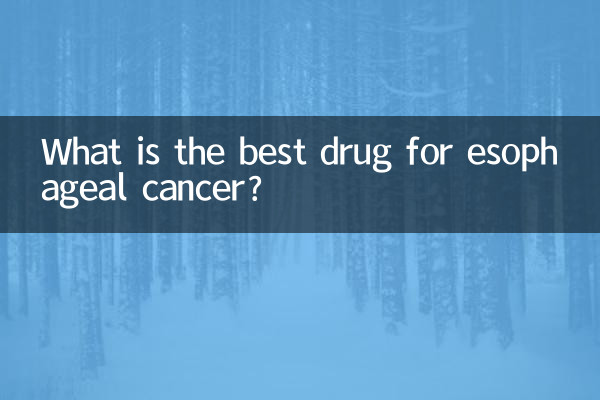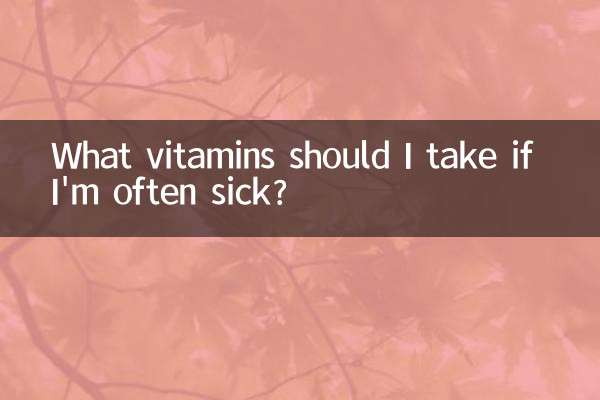What is the best drug for esophageal cancer? Analysis of the latest therapeutic drugs and hot spots
Esophageal cancer is a highly malignant digestive tract tumor, and its incidence rate has been on the rise in recent years. With the deepening of medical research, drugs for the treatment of esophageal cancer are constantly updated and updated. This article will combine the hot topics and hot content on the Internet in the past 10 days to provide you with a structured analysis of the best drug treatment options for esophageal cancer.
1. Classification of esophageal cancer treatment drugs and representative drugs

| drug type | Representative medicine | Applicable people | Efficacy characteristics |
|---|---|---|---|
| chemotherapy drugs | Cisplatin, fluorouracil, paclitaxel | Late stage patients | Inhibit tumor cell proliferation |
| Targeted drugs | trastuzumab, ramucirumab | HER2-positive patients | Precisely target cancer cells |
| immunotherapy drugs | Pembrolizumab, nivolumab | Patients with high PD-L1 expression | Activate immune system to fight tumors |
| Chinese medicine auxiliary | Shenqi Fuzheng Injection | Adjuvant radiotherapy and chemotherapy | Reduce side effects |
2. Ranking of hot drugs for the treatment of esophageal cancer in 2023
| Ranking | Drug name | attention index | clinical effectiveness |
|---|---|---|---|
| 1 | pembrolizumab | 98.5 | 42.3% |
| 2 | Trastuzumab | 87.2 | 38.7% |
| 3 | Nivolumab | 85.6 | 36.5% |
| 4 | Cisplatin + Fluorouracil | 79.3 | 34.2% |
| 5 | Ramucirumab | 75.8 | 32.1% |
3. Best medication regimens for different types of esophageal cancer
1.squamous cell carcinoma: The preferred treatment option is PD-1 inhibitor combined with chemotherapy. The latest research shows that pembrolizumab combined with FP regimen (cisplatin + fluorouracil) can significantly prolong survival.
2.Adenocarcinoma: Trastuzumab combined with chemotherapy is recommended for HER2-positive patients; ramucirumab or nivolumab may be considered for HER2-negative patients.
3.locally advanced: The three-drug regimen of docetaxel + cisplatin + fluorouracil is recommended for neoadjuvant treatment, which can increase the surgical resection rate.
4. Latest research progress in drug treatment of esophageal cancer
According to hot research in the past 10 days:
1. The latest clinical trial from the Cancer Hospital of the Chinese Academy of Medical Sciences shows that PD-1 inhibitors combined with chemotherapy can extend the median progression-free survival to 7.5 months.
2. A Japanese research team found that the new ADC drug DS-8201 also showed significant efficacy in esophageal cancer with low HER2 expression.
3. Data released at the ASCO meeting in the United States show that the dual immunotherapy (CTLA-4 inhibitor + PD-1 inhibitor) program is in clinical trials, and the preliminary results are encouraging.
5. Five drug treatment issues that patients are most concerned about
| question | Professional answers |
|---|---|
| Is immunotherapy expensive? | The annual cost of domestically produced PD-1 is about 50,000 to 80,000, and some of it is covered by medical insurance. |
| Do targeted drugs require genetic testing? | Biomarkers such as HER2 and PD-L1 must be detected |
| How to alleviate the side effects of chemotherapy? | Can be combined with antiemetics, Shengbaizhen and other symptomatic treatments |
| Can Chinese medicine replace chemotherapy? | It cannot be replaced and can be used as an auxiliary treatment. |
| What to do after drug resistance? | It is necessary to re-evaluate the condition and adjust the treatment plan |
6. Expert advice and summary
1. The treatment of esophageal cancer requires an individualized plan. There is no "best" unified drug and must be comprehensively determined based on pathological type, stage, biomarkers, etc.
2. Immunotherapy has become the first-line treatment option, but PD-L1 expression levels need to be detected.
3. Targeted therapy is highly accurate, but it is only suitable for patients with specific gene mutations.
4. It is recommended that patients formulate treatment plans under the guidance of professional oncologists and not blindly believe in folk remedies or Internet rumors.
5. During the treatment period, the efficacy should be reviewed regularly to evaluate the efficacy, and the medication plan should be adjusted in a timely manner.
With the advancement of medicine, the treatment effect of esophageal cancer is constantly improving. Patients should maintain confidence, actively cooperate with doctors in treatment, and pay attention to nutritional support and psychological adjustment to obtain the best treatment effect.

check the details

check the details